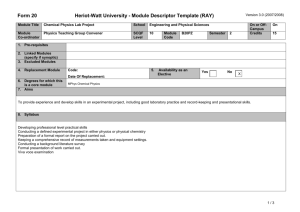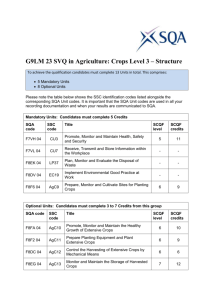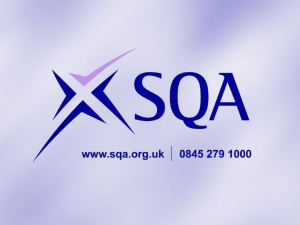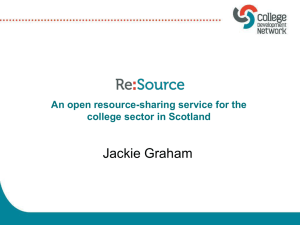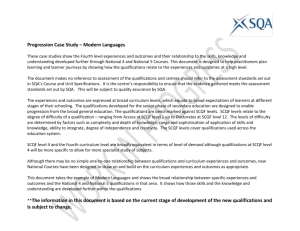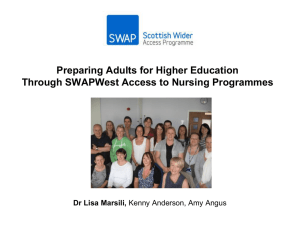BAIPS Overview - Scottish Care
advertisement
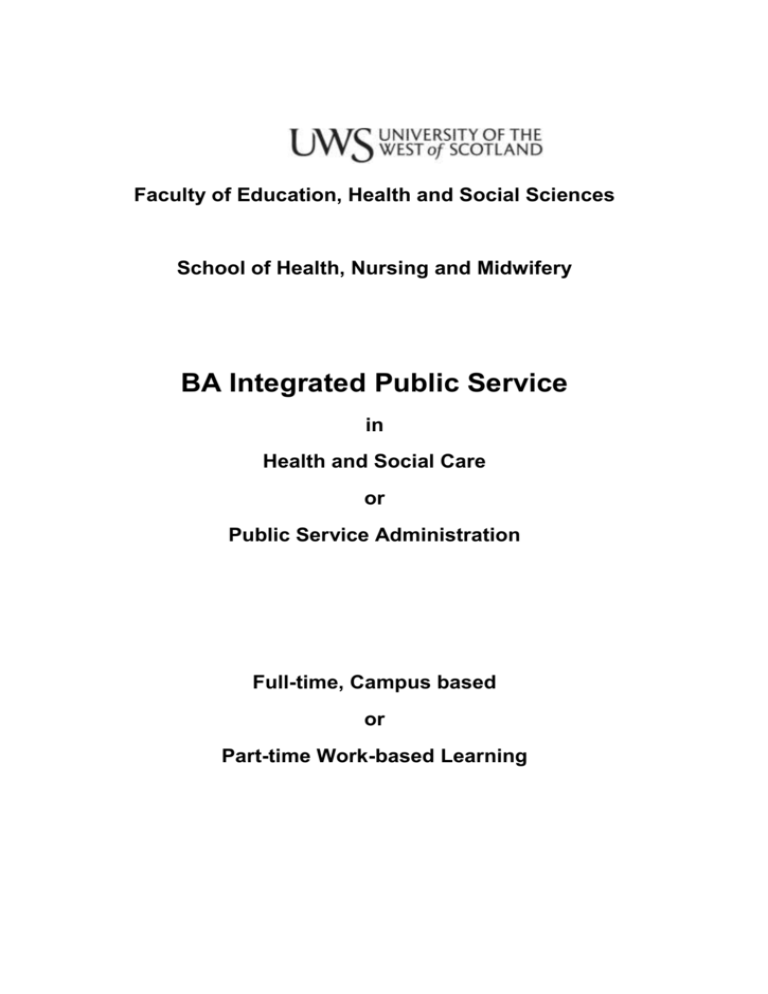
Faculty of Education, Health and Social Sciences School of Health, Nursing and Midwifery BA Integrated Public Service in Health and Social Care or Public Service Administration Full-time, Campus based or Part-time Work-based Learning 1. Rationale Full-time programme The full-time BA Integrated Public Service is an articulated programme the first year of which comprises a relevant HNC award or equivalent. Years two and three of the programme are provided by UWS. At present there are two pathways leading to separate minor awards: - Health and Social Care Public Service Administration. Part-time, work-based learning programme The part-time, work-based learning programme is designed for experienced public service support staff. It consists of the same modular structure and award pathways as the full-time BA Integrated Public Service. The two programmes differ in duration and delivery but share the same learning outcomes and assessments. The part-time, work-based learning programme can be completed over three or four years (see Appendix). A blended learning approach is used which involves a mixture of e-learning delivery and study day attendances (6 per module). In addition regular tutorial support will be provided throughout the programme. A summary of the main differences between the full and part-time programmes is provided in Table 1. Table 1: Main differences between full and part-time BA Integrated Public Service programmes BA Integrated Public Service Entry Requirements Full-time Relevant HNC or equivalent APL/APEL credit Successful completion of First Steps to Integrated Public Service module (from September 2012) Duration Location and Nature of Engagement Normally completes the programme in 2 years Normally undertakes 6 modules in 2 trimesters per year (Appendix 3) Attends classroom based lectures and tutorials and participates in whole class and small group Part-time Relevant HNC or equivalent APL/APEL credit Successful completion of First Steps to Integrated Public Service module Employed full-time or part-time within a relevant public service organisation, public, voluntary or third sector Signed agreement of support from employer Can complete the programme in 3 or 4 years Can undertake 3 or 4 modules over 3 trimesters per year(Appendix 4) Is allocated to a small group of 610 students for the duration of the programme activities as per weekly timetable Self-directed study incorporated within weekly timetable Completes module assessment that demonstrates achievement of learning outcomes Has access to online discussion boards, chat rooms and blog sites enhancing communication with other students on the programme Practice Learning Undertakes 6 weeks of placement per year arranged by the University Each placement has an agreement identifying responsibilities of placement provider, student and University which includes educational audit Placement learning experience is overseen by nominated UWS liaison lecturer Profile of competences completed to meet the assessment requirements for practice learning modules Integrated Practice 1 (SCQF Level 8) and Integrated Practice 2 (SCQF Level 9) Support Each student is allocated to a named personal tutor who is normally a lecturer who is a member of the programme team Each student meets with personal tutor at specific times throughout the academic session and can seek guidance from personal tutor as necessary Potentially students have support of peer group on a daily basis when attend lectures and participate in small group activities and also informally through social Attends fortnightly tutorials which are facilitated by a designated personal tutor to enhance and support work-based learning elements of the programme Engages in work-based e-learning activities that relate to the content and learning outcomes of each module Attends classroom based lectures and participates in whole class and small group activities essential for completion of module assessment on 6 days per module Has access to online discussion boards, chat rooms and blog sites enhancing communication with other students on the programme Work-based learning occurs in the student’s own area of employment throughout the programme Learning guided by work-based elearning activities relevant to each module in the programme Placement agreement between employer and University includes educational audit and clearly identified roles and responsibilities of employer, student, identified workplace mentor and UWS personal tutor Profile of competences completed to meet the assessment requirements for practice learning modules Integrated Practice 1 (SCQF Level 8) and Integrated Practice 2 (SCQF Level 9) Where there is insufficient relevant experience available within a workplace to provide evidence of achievement of competences and learning outcomes, a placement outwith the student’s own area of employment is arranged by the University Each student receives support from a named personal tutor who facilitates small group tutorials on a fortnightly basis to enhance reflection on work-based learning throughout the programme Each student receives support from their employer in the form of a signed statement and agreement Each student receives support from a designated workplace mentor throughout the programme Students benefit from peer support at regular tutorials and study days activities Students have access weekly to the full range of support services within the wider university Whilst on placement each student receives support from a named mentor and liaison lecturer (6 per module) and informally through social activities Students have access to the full range of support services within the wider university The design of the part-time programme in relation to the use of a blended approach incorporating work-based, e-learning activities fits with the QAA Codes of Practice for the assurance of quality and standards (QAA 2007, 2010). Module learning outcomes are relevant to and enhance everyday practice (QAA 2007). Engagement with e-learning activities facilitates the development of a critically reflective approach to learning through experience which is supported by regular tutorials and constructive feedback from a workplace mentor, personal tutor and peer student group (QAA 2010). As the part-time and full-time programmes share the same learning outcomes and assessment, the arrangements for assuring quality and standards are equally rigorous (QAA 2010). Overview of Context and Purpose of the BA Integrated Public Service The integrated public service degree aims to address future demand for different occupational roles within health and social care. It is linked to perceived changes in professional roles and associated workforce development needs (Scottish Government 2010a) and the drive for effective and efficient integrated care provision (Scottish Government 2003). The programme aims to address a need to provide care workers who are capable of identifying the diverse and complex needs of individual clients and providing holistic care thereby reducing fragmentation and improving care quality. It also aims to contribute to the development of an administrative framework that understands the importance of and is capable of supporting efficient, integrated care provision (Scottish Government 2010b). The development envisages a three-tiered occupational role structure. The first tier is occupied by an HND qualified support worker who is capable of supporting individual and small groups of clients and providing specific care interventions within a defined scope of competence and who is responsible to a caseload manager (Scottish Government 2010b). Tier two is occupied by a graduate who is capable of managing a client caseload and making decisions about care interventions and client referral. The third tier is occupied by an experienced, professionally qualified practitioner who has a master’s degree and who has specialist knowledge of the specific needs of vulnerable groups of clients and is capable of participating in policy development and implementation. An important element of the integrated public service degree is the emergence of integrated care provision and associated development of an integrated health and social care support worker role (NES/SSSC 2009, Scottish Government 2010a). Scotland’s population is ageing and declining. By 2035 it is anticipated that there will be a 25% increase in those over 65 years of age and an 8% increase in those over 80 (Scottish Government 2010b). Older people have a higher incidence of ill health and multiple long term conditions and have complex health and social care needs (Scottish Government 2003, 2010a, 2010b). It is anticipated that there will be insufficient resources available to meet the future, increased demand for care. In view of this the Government proposes a shift from care provision which is perceived to be ‘reactive, episodic and fragmented’ to a health and social care system that is ‘integrated, coordinated and preventative’ (Scottish Government 2010b). An integrated approach to care management that aims to improve the experience and outcomes for individuals and their carers requires a different culture and involves working across traditional professional boundaries (Scottish Government 2010b). Integrated service provision aims to provide seamless, person-centred care that is based on a shared understanding of needs (Scottish Government 2003). Effective integration depends on achieving the right skill mix and that includes appropriately developed care workers who are capable of assessing needs and promoting client enablement, self-care and independence (Scottish Government 2003, 2010b). Delegated responsibility and accountability within a newly created partnership requires clearly defined processes and an understanding of the purpose and associated challenges of integrated public service provision (Scottish Government 2003). Greater autonomy in decision making in relation to care provision and resource allocation is normally regulated and there is a requirement for all social care workers to become registered with the Scottish Social Services Council (SSSC) by September 2015. Within the NHS induction standards and a code of conduct for support workers and a code of practice for employers have been developed (Scottish Government 2009). The integrated public service degree aims to provide an academic pathway for the development of health and social care workers and administrators that will adequately prepare them for future roles within public service provision and also meet the requirements for employer registration. The part-time, work-based learning programme must address the needs of existing experienced support workers and care staff who will benefit from accessible RPL mechanisms, greater programme flexibility and academic support to facilitate transition. At present no other programme exists that specifically addresses the development needs of public service administrators. The integrated public service degree will provide an opportunity for individuals to undertake a programme that enables them to understand the importance of an efficient administrative framework to support effective, integrated care provision. Current educational provision to meet workforce development needs is perceived to lack ‘consistency, recognition and transferability’ and there is a need for educational provision that is ‘flexible, accessible and quality assured’ (Scottish Government 2010a). Health and social care worker development is necessary to release professionals and to develop capability. However, there is a demand to meet diverse and varied needs of a broad range of individuals. The challenge is to provide different levels of preparation that will support individual career development and progression (NES/SSSC 2009). Programme Aims and Outcomes The programme aims to: - - - - Develop professional attitudes, leadership and management skills to enable graduates to contribute confidently to evidence based practice, informed by a value base of rights and respect for service users within an integrated service provision. Develop students’ understanding of policy, practice, ethical and socioeconomic factors which affect each element of an integrated service across the range of public services. Enhance students’ capabilities and employability in public services by, for full-time students providing practice opportunities in a range of workplace contexts beyond the students’ initial fields of training, and for both full-time and part-time students, by supporting engagement in the management of workplace practice, and encouraging innovative approaches to the improvement of quality within integrated public service provision. Enhance lifelong learning engagement and an appreciation of the value of continuous personal and professional development within public service employment. By the end of the degree programme graduates will: - Be equipped with the appropriate knowledge and skill that will enable them to effectively meet the public service needs of vulnerable individuals and groups. - - Demonstrate an appropriate level of autonomy, responsibility and accountability to meet future demand for a flexible and adaptable public service workforce. Understand the importance of promoting an integrated, client-centred approach to public service provision. Engage in a critical evaluation of service provision outcomes ensuring a commitment to continuous quality improvement. In relation to specific roles, prepare to meet the criteria for the regulation of public service employees following completion of the programme. Potential Opportunities Provided by the Programme The programme aims to prepare graduates who are able to meet the complex health and social care needs of clients, their families and carers within a variety of occupational roles associated with integrated public service provision. It also aims to ensure that graduates clearly understand and are able to tackle the challenges of integrated public service provision and the associated need for cultural change. Students on the full-time programme are full-time students and are recruited from colleges. Applicants require successful completion of a relevant HNC or equivalent and a UWS transition module. Part-time students are likely to be existing employees within the public sector who meet the entry requirements through Recognition of Prior Learning (RPL). Opportunities for post graduate study at UWS include programmes leading to a professional qualification in Nursing and Education and occupation specific courses such as the MSc in Vulnerability, and also drug and alcohol studies, autism and business management. In summary, the BA Integrated Public Service programme aims to: - Prepare graduates for integrated public service provision particularly with health and social care. Include preparation relevant to roles that involve administration of integrated service provision. Promote development of a clear understanding of the importance of integrated public service provision and associated challenges. Prepare graduates who are able to meet the challenges posed by integrated service provision and its management. Offer step off step on options for students and employees. Fit with the NHS Career Framework Levels 3 and 4. Distinctly focus on integrated service provision and its management. - Enhance opportunities for entry to a wide range of post graduate study options. Emphasise the importance of wider access and participation through the provision of flexible learning opportunities. Enhance employability and career progression within future public service provision for students and existing public service employees. Widen degree pathway options available to college students. The need for integrated service provision to meet the complex needs of clients in future requires practitioners and support workers who can competently collaborate with others from different disciplines. The degree provides an innovative and distinct approach to a degree level qualification that seeks to prepare the ground for increased understanding, enhanced professionalism and effective management within public service provision. References NES/ SSSC (2009) Scope for joint education and training for health and social care support workers in Scotland. Edinburgh: NES Quality Assurance Agency (2007) Code of practice for the assurance of academic quality and standards in higher education: Section 9: Work-based and placement learning. Gloucester: QAA Quality Assurance Agency (2010) Code of practice for the assurance of academic quality and standards in higher education: Collaborative provision and flexible and distributed learning (including e-learning). Gloucester: QAA Scottish Government (2003) Partnership for care: Scotland’s Health White Paper. Edinburgh: Scottish Government Scottish Government (2009) Healthcare support workers in Scotland.Evaluation of a national pilot of standards and listing in three NHS Boards. Edinburgh: Scottish Government Scottish Government (2010a) A guide to healthcare support worker education and role development (revised 2010). Edinburgh: Scottish Government Scottish Government (2010b) Proactive, planned and coordinated: care management in Scotland. Edinburgh: Scottish Government 2. Programme Structure and Delivery Introduction The BA Integrated Public Service programme at UWS provides study at SCQF Levels 8 and 9 to applicants who have already completed a relevant HNC qualification or equivalent. It is designed for both full and part-time provision. Full-time students are expected to complete the programme in two years. The part-time, work-based learning programme is designed for experienced public service support and administration staff and it aims to promote personal growth and provide opportunities that facilitate individual development and enhance potential career progression. Entry to BA Integrated Public Service Programme at UWS The first year (SCQF Level 7) of the programme comprises existing programmes leading to relevant HNC qualifications or equivalent. Normally the qualifications would be SQA approved and provided by further education colleges in Scotland. Table 2 lists some of the existing HNC qualifications that would be considered relevant. University regulations regarding the admission of students apply. According to Section 6.2.2of the Regulatory Framework 2011-2012 (UWS 2011), ‘It may be possible for candidates with an appropriate volume of SCQF credit at level 7 or above or equivalent to be offered direct entry to Level 8.’ Table 2: BA Integrated Public Service Relevant SQA HNC Qualifications Healthcare Learning and Development Care and Administrative Counselling Practice Administration and IT Social Care Business Social Sciences Human Resource Management Working with Communities Recognition of Prior Learning (RPL) Where applicants do not hold a relevant HNC qualification it is possible to make an RPL claim that demonstrates achievement of valid equivalency of learning at SCQF level 7. In keeping with existing UWS RPL guidelines (UWS 2008), a robust approach to assessing and quantifying SCQF Level 7 credit will be undertaken. UWS requires that all credit for learning transferred into a programme must be accredited through RPL and recorded on an academic transcript. RPL claims may include both certificated learning (APL) and learning derived from experience (APEL) providing this can be assessed using the UWS RPL procedure (UWS 2008). APL includes learning that has undergone rigorous assessment and mapping to SCQF by a recognised credit rating body. This includes HNC/D’s and other specific modules and programmes. APEL concerns learning from experience for which the applicant must provide evidence of achievement and which must be mapped onto predetermined learning outcomes. Applicants to the part-time BA Integrated Public Service will be employed as public service support workers or administrators. It is possible therefore that individual RPL claims could include both APL and APEL. Support will be provided in the form of a workshop and guidance on the development of an experiential learning portfolio. Key elements of authenticity, currency, breadth and quality must be demonstrated through a process of critical reflection on learning derived from experience. The UWS guidance on the RPL process for accrediting experiential learning is outlined below (UWS 2008). Academic supervision will be provided by an academic member of staff within the School who has responsibility for RPL. The Lifelong Learning Academy (LLA) will provide advice and guidance to students and staff on the RPL process. UWS principles for processing RPL claims for experiential learning Student makes claim to have prior learning recognised which can be supported with appropriate evidence. Systematically reflects on experience: - Looks at experiences where learning has occurred. - Provides clear statements written in the form of learning outcomes reflecting what has been learned. - Collects and collates evidence in support of claim. - Specifies cognitive skills achieved, complexity of situations in which learning has occurred and whether learning has been achieved independently or under supervision. Assessment of a claim considers a portfolio incorporating: - The learning outcomes - Submission of 3,000 – 5,000 words linking theory to practice. - The relevance and validity of the supporting evidence. Knowledge, understanding demonstrated. underpinning skills should be (Source: UWS RPL Staff Guidelines. (UWS 2008)) Transition to undergraduate study First Steps to Integrated Public Service is a module that is designed to facilitate the transition into higher education for all potential students to the programme, full or part-time. Successful completion of the module is a condition of entry. All applicants to the programme can undertake the module in Trimester 3 of the preceding session. It runs from June until August and delivery is the same for both full and part-time applicants. The module aims to prepare students for study at Level 8 and provide insight into the nature and purpose of integrated public services. It enables learning through participation in a variety of activities involving reflection on past and current experience. Workshops promote development of key skills necessary for entry SCQF Level 8 of the BA Integrated Public Service including skills in literature searching, essay and report writing, referencing, ICT and presentation. Students are also introduced to the processes of needs assessment and community profiling. Utilising a thematic approach within a health and social welfare context the module aims to stimulate the development of an understanding of the accuracy and credibility of evidence sources whilst fostering skills of constructive criticism and team membership. The module involves attendance at five, one-day, lecturer led workshops. In addition students will require to spend about 17 hours per week in self-study during a 10-week semester. Workshops will involve participation in a range of activities including: Understanding the meaning and context of integrated public service. Identifying contemporary health and social welfare issues. Essay writing, literature searching and referencing. Gaining insight into the process of community profiling. Statistical analysis. Familiarisation with needs assessment processes and social policy. Report writing and presentation. Portfolio development. Using a reflective diary. Working in small groups students will be supported by a lecturer acting as learning facilitator throughout the module. Participation in activities will promote a positive attitude towards a team approach and enable students to: Explore the knowledge, skills and personal attributes necessary for working within an integrated public service. Develop awareness of a range of learning strategies that include skills in self-appraisal of personal learning needs and goal and action planning. With reference to one specific health and social welfare issue, develop and ability to access, utilize and reference credible sources of information. Develop essay and report writing skills. Begin to develop skills in accessing and analyzing statistical data. Demonstrate ICT skills. Develop critical reflection and problem-solving skills. Completed activities will form the basis of a portfolio that will be summatively assessed at the end of the module. The module is accredited with 20 points at SCQF Level 7. SCQF Level 8 and 9 At each SCQF Level (8and 9) there are four generic modules that relate to the major title BA Integrated Public Service and an option that relates to each minor award, health and social care or public service administration. At each level, for full-time students, there is also an identified placement experience in an environment relevant to the award, either in health and social care or public service administration. Part-time students benefit from learning from practice within their own area of employment throughout the programme. However, where there is insufficient relevant experience to provide evidence of achievement and competence a placement will be arranged by the University outwith the student’s own area of employment. The 12 modules leading to the degree award can be taken over three or four years (See Appendix 4). Flexible learning The part-time, work-based learning programme allows greater flexibility than one which is taught especially in relation to the degree of control that the student has over where and when coursework is completed. The programme will consist of the same modular structure as the full-time BA Integrated Public Service. The main difference between the two programmes will be in the duration and format. The part-time, work-based learning programme can be completed over three or four years. A blended learning format will be used and learning materials will be based on learning activities that are designed to promote critical reflection on active learning experiences within the workplace. Normally students will require approximately 12 – 15 hours of study per week for the duration of a 15-week module. Personal tutor support and tutorial groups Individual student development and learning will be supported by a personal tutor who will be a University lecturer. At the beginning of the programme each student will be allocated to a group of about 5 – 10 students, led by a named personal tutor who guides student learning throughout the programme. Group tutorials will be held fortnightly for about 2 – 3 hours. Normally students will be expected to attend all tutorials. In addition, the personal tutor will provide feedback to individual students on their work, face to face, by telephone and in writing. Students will also be able to communicate with fellow students at the tutorials and online. Workplace mentoring Within the workplace each student will be supported by a designated workplace mentor who will be identified at the start of the programme. The role of the mentor involves facilitating the identification of individual development needs and ensuring that the student has adequate opportunity to meet their needs within the workplace. Workplace mentors are supported throughout the programme by the student’s personal tutor. The student, workplace mentor and personal tutor will meet to discuss and report on progress during each of the modules. Study days and study time In addition to the tutorials students will be expected to attend six study days per module at the University in order to participate in module specific activities including modified lectures, group seminars, action learning sets, class debates and so on as indicated within each module descriptor. In order to support learning it is recommended to employers that students receive the equivalent of 3 hours per week study leave for the duration of each module. This amounts to about 540 hours (15 weeks) study leave for the entire 3 or 4 year programme. Placements It is anticipated that, normally, part-time students will be employed within an organisation that provides relevant placement experience which will enable required learning outcomes to be achieved within the workplace. A placement learning agreement will be drawn up for each student which will clarify the specific responsibilities that the student, employer and University must accept if student exposure to the relevant experience and required support is to be ensured. Students will be offered an option to have a placement outwith their normal place of work. This may be essential if the workplace does not provide sufficient relevant experience for the student to demonstrate achievement of the learning outcomes. The following are essential elements of the practice learning agreements: - Each student within each placement will have an identified mentor. The mentor’s role will be clearly outlined. Guidelines will clearly outline the role expectations and responsibilities of the student, provider/employer, University and mentor. The nature and purpose of the experience and relevant exposure will be clearly defined. Expected achievements and limitations of participation by students will be clearly identified. The process of achievement and assessment of learning outcomes and standards will be clearly identified. Responsibility for achievement and assessment of the required standards will be clearly identified Channels of communication between the student, mentor, placement provider/employer and the University will be clearly identified. Practice learning agreements will be reviewed annually. For an outline of roles and responsibilities see Appendix 6. Programme Exit Points On successful completion of the six SCQF Level 8 modules - four core, one option and the Integrated Practice 1 module, it is possible to exit with a Diploma in either Public Service Administration or Health and Social Care depending on the option chosen and the relevance of the integrated practice placement experience. Those who complete the modules at SCQF Level 9 will be eligible for the award of BA Integrated Public Servicein eitherAdministration or Health and Social Caredepending on the chosen options and the relevance of the placement experience in the Integrated Practice modules. In accordance with UWS Regulatory Framework 2011 - 2012 (UWS 2011) the BA IntegratedPublic Service programme ‘enables fulfilment of the University’s graduate skills and attributes and learning outcomes and is equivalent to 3 years full-time study.’ In relation to the development of graduate skills and attributes the programme aims to achievethe following: - - Develop critical analytical problem-based learning skills and the transferable skills to prepare the student for graduate employment. Enable students to engage in lifelong learning, study and enquiry and to appreciate the value of education to society; to assist the student to develop the skills required for both autonomous practice and team working. Aim to stimulate an enquiring, analytical and creative approach, encouraging independent judgement and critical self-awareness. 3. Programme Structure – Module Outline and Overview There are six modules at both SCQF Level 8 and SCQF Level 9. Each level comprises four core modules, one practice based module and one option module selection in either public service administration or health and social care. As such, the modules are all core to the degree programme, exit award and pathway title. SCQF Level Module Title Module Code 8 Dimensions of Health and Social Welfare NURS08036 8 Integrated Public Service Provision NURS08037 8 Foundations of Wellbeing NURS08038 8 The Organisation of Health and Social Welfare Provision NURS08039 8 Integrated Practice 1 NURS08040 8 Option Module: A Systematic Approach to Care Delivery NURS08041 Or Context of Public Service Management BUSN08028 9 Managing in the Public Sector BUSN09021 9 Contemporary Issues in Health and Welfare NURS09167 9 Quality Improvement NURS09168 9 Research Methods for Public Service BUSN09001 9 Integrated Practice 2 NURS09169 9 Option Module: Leading Integrated Practice NURS09170 Or Strategic Planning and Performance Management BUSN09006 SCQF Level 8 modules provide an introduction to the broad principles of health and social welfare and the organisation and management of an integrated public service provision. The aim is to promote integrated public service perspective and to facilitate the development of a critical and informed approach to effective provision of health and social care and administration. The modules provide the theoretical principles underpinning the subject and utilise active learning components to promote integrated practice through the experience of participation. SCQF Level 9 modules focus on the development of knowledge and skills of management and leadership. A critical approach to managing and leading effective public service provision and administration is promoted particularly in relation to quality improvement and evidence-based practice. A variety of approaches is employed to promote learning and the successful achievement of programme and module outcomes. Active learning through participation in group activities is predominant throughout the programme. Approaches include modified lectures, seminars, tutorials, independent study, student-centred critical reflection and participation in group presentations, action learning sets and problem-solving activities, class debates and Blackboard discussions. In the practice modules active participation in competence achievement and assessment is promoted through processes that involve self-evaluation, identification of learning and development needs and goal and action planning. Independent learning is promoted during the programme by encouraging students to take increasing personal responsibility for achieving learning objectives through their own efforts and at their own pace. As students progress through the programme there will be a gradual shift from the scaffolded structure of the transition module to a more open approach at SCQF Level 9 where students will be expected to assume greater responsibility for and control over their learning. The overall aim of the approach to learning is to provide opportunities that will stimulate learning and enable individuals to construct meaning and knowledge. 4. Assessment The assessment strategy is designed to provide a robust measurement of achievement of learning that will inspire confidence in the integrity of the award. It is essential that assessment appropriately reflects the SCQF levels in which it is set. Assessment is also an integral part of the learning process within this degree and it reflects the main purpose and aims of the programme. The main principles and underpinning assessment are that it: - - Acknowledges and builds on students’ prior learning from academic study and work experience that is relevant to the subject. Promotes academic and practice development through use of assessment methods that are relevant and appropriate to the subject and the aims of the programme and modules. Facilitates the integration of theory and practice by linking these elements within assessment activities. Assessment is embedded within module activities and reflects the value of learning through the experience of active participation. Within each module critical reflection on the impact of learning processes and outcomes on personal development is promoted and students are encouraged to include these reflective accounts within their PDP portfolios. In order to facilitate successful achievement most summative elements of assessment will be preceded by formative feedback to students. The extent of formative assessment and feedback offered to students will be agreed in advance by the programme and module teams. Clear information and guidance on the nature and purpose of summative and formative assessment processes will be available to students on commencement of each module. A varied and diverse range of assessment methods have been employed within the modules including: Short answer/class tests Reflective accounts Seminar presentations Group problemsolving activities Assignments Essays Reports Critical incident analyses Participation in debates Case studies Coursework activities Participation in Action Learning Sets Profile of competences overtaken class Contributions to Moodle discussions Group presentation Practical assessments Appendix BA Integrated Public Service Part-time Programme 3 and 4 Year Programme Flows BA Integrated Public Service – Part-time 3-year Programme Year Trimester 1 Year 1 Dimensions of Health and Social Welfare (SCQF Level 8) Trimester 2 Foundations of Wellbeing (SCQF Level 8) Trimester 3 A Systematic Approach to Care Delivery (SCQF Level 8)/or Context of Public Service Management (SCQF Level 8) Integrated Practice 1 (SCQF Level 8) Year 2 Integrated Public Service Provision (SCQF Level 8) The Organisation of Health and Social Welfare Provision (SCQF LEVEL 8) Contemporary Issues in Health and Welfare (SCQF Level 9) Leading Integrated Practice (SCQF Level 9)/ or Strategic Planning and Performance Management (SCQF Level 9) Year 3 Managing in the Public Sector (SCQF Level 9) Research Methods for Public Service (SCQF Level 9) Quality Improvement (SCQF Level 9) Integrated Practice 2 (SCQF Level 9) BA Integrated Public Service – Part-time 4-year Programme Year Trimester 1 Year 1 Dimensions of Health and Social Welfare (SCQF Level 8) Foundations of Wellbeing (SCQF Level 8) A Systematic Approach to Care Delivery (SCQF Level 8)/ or Context of Public Service Management (SCQF Level 8) Year 2 Integrated Public Service Provision (SCQF Level 8) The Organisation of Health and Social Welfare Provision (SCQF Level 8) Integrated Practice 1 (SCQF Level 8) Year 3 Contemporary Issues in Health and Welfare (SCQF Level 9) Quality Improvement (SCQF Level 9) Leading Integrated Practice (SCQF Level 9)/or Strategic Planning and Performance Management (SCQF Level 9) Year 4 Managing in the Public Sector (SCQF Level 9) Research Methods for Public Service (SCQF Level 9) Integrated Practice 2 (SCQF Level 9) Trimester 2 Trimester 3


